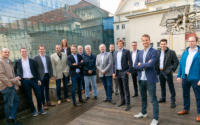Vandaag hebben we onze engineering manager, Deepika Lalwani, uitgenodigd. Zij is een veelzijdige vrouw die veel van de wereld heeft gezien. Met een opmerkelijke positiviteit en motivatie leidt ze ons team van ontwikkelaars. Ze deelt haar ervaringen over het verhuizen naar Nederland, het maken van haar carrièrekeuze en het zoeken naar uitdagingen. In het bijzonder vragen we haar mening over vrouwen in de techniek. Deepika geeft advies aan vrouwen die dit carrièrepad overwegen en hoe ze met vooroordelen om kunnen gaan.
Lees verder of luister onze podcast om te weten hoe haar dag eruit ziet. Wat is het coolste project waar ze aan gewerkt heeft? En wat zijn de belangrijkste dingen waar ze naar op zoek is bij het interviewen van kandidaten?
Hi, Deepika! Thank you for accepting my invite to talk about women in tech as an overarching topic. First of all – how are you? How are you coping with these difficult times? And working from home?
Thanks, thanks for having me. Really happy to share my thoughts on these topics. I’m doing great! These are some tough or new times to be in. But I think we have made some good deliveries this year. So I can say that we are definitely not less efficient than we were before this pandemic. We all have learned to work in this new time.
How was the transition from working from the office to working from home completely?
Actually, as we were already working two days from home, that definitely helped to make this transition. For me, I tried to make a small office for myself in my house. We don’t see each other face to face and that sometimes can make things difficult. What I do right now, I try to make small calls rather than type. It has been pretty efficient and fast as well.
Another more personal question, you’ve moved to the Netherlands all the way from India. Can you tell me more about how long you have been here, your decision to move abroad and experience so far?
Indeed, I moved from India to the Netherlands to join PublicSonar. It has been almost three years. It was definitely a big decision to leave Microsoft in India and join here in a new country. There’s two aspects which helped me a lot. One was that I was moving with my partner here. This made it easier and exciting to move and explore together. The other was, during the interview phase, I had quite a lot of interaction with Richard and Sjors. I also met them face to face before I really moved here. That definitely gave me a sense of confidence before I joined.
You are currently our software engineering manager. How is it to lead an international team? And how do you think being female has influence on the team dynamics?
When I joined here, I was a senior software developer and I got promoted as engineering manager. Indeed, we have a pretty international team. It definitely helps to get to know different perspectives. When you’re working on a project, you have different perspectives and qualities, which everyone brings to the table. And together we make a really good team. For me, even if I live in the Netherlands I have lived through many cultures. It was something I was looking for when I moved here and it has been great!
And what sparked your interest to enter the industry in the very beginning?
It started during my studies, I always liked mathematics and problem solving. From there when I started programming, I found out that I can write code and I’m good at it. So I think it came out naturally from there and my interest grew in this area.
Can you share a little bit about what it is that you do and what a typical day for you is like?
Being a manager entails lots of different tasks. It starts with people management. This includes looking for potential candidates for growing the team, doing the reviews and feedback sessions. Then, the delivery management, which includes all the releases and planning. We follow Scrum, so we work in two-week sprints. Part of my job is planning the sprint and doing retrospective evaluation – see what went good, wrong, or can be improved. Whenever I have time myself, I look into technical tasks. From my experience as a developer, myself, I try to make sure that everyone has enough resources to work on their task, they are not blocked, and getting all the help they need. When I was a developer, the one thing which frustrated me was when I got blocked, and I didn’t have enough resources to make the progress. Now, my first priority is to give them all the help they need to make progress.
What are some highlights of your job? What keeps you going, gives you energy and motivates you to do what you do?
The thing I like about PublicSonar the most is that we are doing purpose-driven work. Dealing with social media and processing high volume data is itself technically challenging. We are a small technical team. It’s a big responsibility when you are the first point of contact for any issues or projects part of PublicSonar. But it’s also a big pride to know things end to end and have independence to make decisions. That’s really empowering.
What is the coolest project you have worked on in PublicSonar?
There are many. But there’s one about migrating our application from one cloud provider to another. And it was a long and technically challenging project, which required a lot of management. We were working on it as a whole team around six to seven months to achieve this. I think it was pretty cool and a great success.
Do you notice a lack of women in technology? If so, why do you think that’s the case?
I would acknowledge that there is a lack of women in technology, statistically and from my past experience. In all the companies I worked, the ratio of women was far less than the men. The reason is, talking in terms of India, already started when I was studying computer science. In college, the ratio for women was way less than the men. I think it is more of a stereotype. There were definitely less female role models when I was making the decision to join the tech industry. But now there are great women to look up to and the numbers have been definitely increasing.
Do you yourself have a role model, a woman that you’re looking up to?
There’s many great women in many jobs, not just in tech. In my team, the women working with us are doing so great and it makes me so proud. I also learn from them.
For you personally, how does it feel to be a woman working in tech? How do you overcome biases?
I think I was lucky enough to not see any kind of conscious bias happening towards me. When joining PublicSonar, I didn’t have any management or experience. But based on my potential I was given this promotion, which is really rare in the industry. Women get promoted based on their work history. So I was very privileged. But there’s definitely a performance bias and a lot of unconscious bias. The one thing we can do is to speak about it and try to get more and more involved in making decisions.
What advice would you give to women entering the tech field? Anything you wish you had known?
When I was considering this as a career choice, I was worried if I’ll get enough job opportunities as a woman. Now, I would say the career options are pretty good and more companies are hiring women candidates. The only advice I can give is take all the challenges or opportunities coming your way. That’s what I have been doing, even though it scares me, I just go for it. That always helps and keeps you moving. After trying multiple times, you get better. So just keep trying. I’ve been helping my cousins and family to take this career decision. They keep asking how to code and I’m more than happy to help them.
As you are now proceeding to take the next big step in your professional career. What is the main thing you look for in your successor? Any tips?
I have been interviewing some candidates for my replacement. The most important thing is technical knowledge. That cannot be compromised in any way. Apart from that, we are also looking for someone who can grow and coach the team. It is crucial to help and mentor them. Someone who has experience attracting new talent is also something we are looking for. These are the two qualities which are really necessary for an engineering manager. Creating a team is one of the most important. Making sure that everyone feels included, open to talk, heard and praised. We will be definitely focusing on someone who can grow the team together with the technical background.











